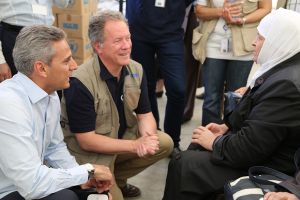WFP Executive Director Visits Lebanon And Syria, Urges Continued Donor Support
The Executive Director of the United Nations World Food Programme (WFP), David Beasley,concluded a three-day visit to Lebanon and Syria where he assessed the growing humanitarian needs of vulnerable Syrians and met senior government officials and partners to discuss humanitarian operations in both countries on May 03.

ED Beasley (center) and Regional Director Muhannad Hadi (left) speaking to Nagwan, an elderly 73-year-old woman displaced from her home in Syria. She depends on WFP food assistance so as not to overburden her brother, who has been hosting her since the Syrian conflict began.
In his first visit to WFP operations since assuming office last month, Beasley spent time with Syrian refugee families in the Bekaa Valley and Beirut, and met displaced women and children at a WFP food distribution centre in Damascus.
“I am touched by the stories of the struggle and resilience of the many Syrians I met who are living away from home and loved ones. These families were broken apart, but WFP and our partners are doing everything in our power to provide the best for their children despite the odds,” Beasley said.
Beasley saw first-hand WFP operations in both Lebanon and Syria, visiting warehouses, food distribution centres in Damascus, and makeshift settlements where hundreds of thousands of Syrian refugees live in Lebanon. He also visited WFP-contracted supermarkets where the most vulnerable refugees redeem monthly electronic food vouchers.
“WFP has adopted flexible and cost-efficient systems to assist the most vulnerable Syrian families so they do not slip into hunger or have to move farther to survive,” said Beasley. “We continue to depend on the vital support from our donor countries – especially Germany, Canada and the United States – to help people to put food on the table for their families and the generation born far from home.”
WFP provides monthly life-saving food assistance to more than four million vulnerable people each month inside Syria through regular deliveries as well as cross-border, cross-line and air deliveries to areas not reachable through regular means.
In Lebanon, almost 700,000 vulnerable Syrian refugees receive food assistance through an electronic voucher (e-card) system. Each month, e-cards are loaded with US$27 per person, which can be used to buy fresh food in any of WFP’s 480 contracted shops across Lebanon.
In his meetings, Beasley appealed for regular, unimpeded and sustained humanitarian access to deliver urgently needed food assistance to people in besieged and hard-to-reach areas across war-torn Syria and commended Lebanon for its generosity in hosting over one million Syrian refugees.
The suffering of millions of Syrians will only be alleviated when a viable political solution to the conflict is reached, allowing families to return, to rebuild lives and re-establish their livelihoods.
Since the early stages of the conflict, WFP has been on the frontlines inside Syria, in Lebanon and across the region delivering life-saving food assistance to millions of people facing poverty and hunger.
Source:World Food Programme
- 338 reads
Human Rights
Fostering a More Humane World: The 28th Eurasian Economic Summi

Conscience, Hope, and Action: Keys to Global Peace and Sustainability

Ringing FOWPAL’s Peace Bell for the World:Nobel Peace Prize Laureates’ Visions and Actions

Protecting the World’s Cultural Diversity for a Sustainable Future

Puppet Show I International Friendship Day 2020

